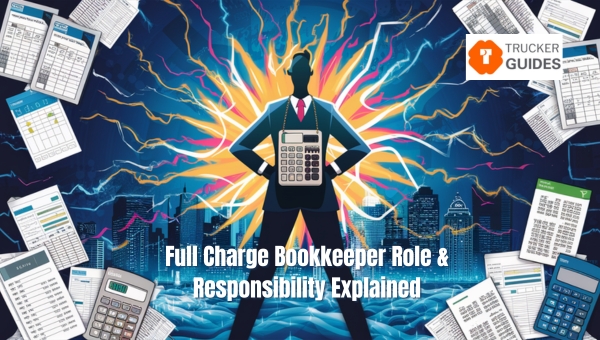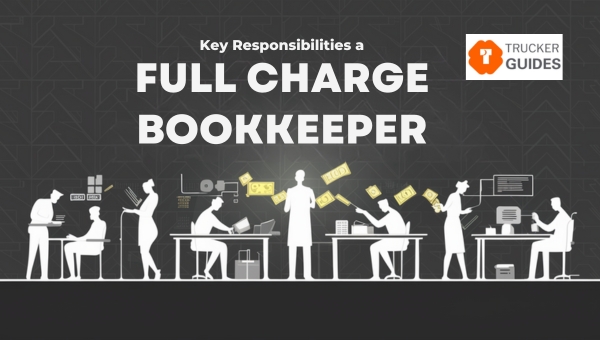Full Charge Bookkeeper Role & Responsibility [Explained]


If you’re curious about the Full Charge Bookkeeper Role & Responsibility, you’re in the right place. In this article, we’ll dive into the key duties and qualifications of this pivotal role. From managing general ledgers to processing payroll, and supervising junior staff, we cover it all.
You’ll also learn about the educational requirements and desired skills needed to excel. Plus, we’ll compare this role to other accounting positions. Ready to unlock the secrets of a full-charge bookkeeper’s world? Let’s get started.
When it comes to the world of bookkeeping, the role of a full-charge bookkeeper is both varied and essential.

This professional handles a wide range of responsibilities that keep a business’s financial health in check. Let’s dive into some of the key tasks they manage.
Accurately recording and categorizing financial transactions is essential for maintaining clear and organized financial records. This process involves documenting all income and expenses into appropriate accounts and sub-accounts, ensuring that financial data is easily accessible for analysis and reporting.
Bank reconciliation involves comparing a company’s financial records with bank statements to verify accuracy. This process ensures that all transactions are accounted for, identifying discrepancies such as missing entries or errors.
Regular reconciliations help maintain the integrity of financial records and prevent fraudulent activities.
Managing accounts receivable and payable is crucial for maintaining healthy cash flow. This includes invoicing customers, tracking payments, and following up on overdue accounts.
Efficient management of payables ensures timely payments to suppliers, fostering good relationships and potentially securing favorable terms.
Creating and adjusting journal entries is vital for accurately reflecting a company’s financial data. Journal entries document all transactions, including adjustments for errors or accruals.
This process ensures that the general ledger remains up-to-date, providing a reliable foundation for financial reporting.
Monitoring cash flow is essential for ensuring a business has sufficient liquidity to meet its operational needs. This involves tracking incoming and outgoing cash to identify trends, forecast future cash requirements, and make informed decisions regarding investments or cost-cutting measures.
Payroll management encompasses overseeing the entire payroll process, including calculating employee wages, deductions, and benefits. Accurate payroll processing ensures employees are paid on time while maintaining compliance with tax regulations. E
effective management also involves addressing employee inquiries regarding pay and benefits.
Preparing financial statements and reports, such as balance sheets and income statements, provides insights into a company’s financial health.
These reports are essential for stakeholders to assess performance, make informed decisions, and ensure transparency in financial operations.
Audit preparation involves gathering necessary receipts, records, and documentation required for internal or external audits. This process ensures that all financial information is accurate and readily available for auditors, facilitating a smooth audit process while demonstrating compliance with regulations.
Supervising a team of accounting clerks and bookkeepers is critical for ensuring tasks are completed accurately and on time. Effective team oversight includes providing guidance, training, and support while fostering a collaborative environment that encourages accountability and continuous improvement.
Management reporting involves providing financial insights directly to higher management and stakeholders. These reports highlight key performance indicators (KPIs), trends, and areas needing attention, enabling informed decision-making that aligns with the company’s strategic objectives.
Handling tax compliance includes preparing and filing tax returns while ensuring adherence to tax regulations. This process requires staying updated on tax laws to minimize liabilities and avoid penalties. Effective tax compliance safeguards the company’s financial standing while optimizing its tax position.
Also Read: Understanding Factoring Agreements [Simplify Cash Flow]
Transitioning into the role of a full-charge bookkeeper requires a blend of educational qualifications and essential skills.
This section will delve into the educational background needed and the key attributes that make a successful full-charge bookkeeper.
To embark on a career as a full charge bookkeeper, there are several educational milestones one should achieve. While the specific requirements can vary, here are some common educational prerequisites:
In addition to educational qualifications, possessing a set of specific skills is vital for success in the role of a full charge bookkeeper. These skills ensure efficiency and accuracy in handling financial tasks:
Also Read: Grasshopper vs Google Voice [Which One is Right for You?
When it comes to the average salary for a Full Charge Bookkeeper, there are a few key factors to consider: industry, location, and level of experience.

On average, Full Charge Bookkeepers can expect to earn between $45,000 and $65,000 per year. However, these numbers can vary widely.
Industry:
Location:
Experience Level:
Also Read: 7 UX Metrics to Transform Your User Experience
World of accounting, it’s essential to understand how different roles compare and contrast. This section will help you delve into the distinctions between full-charge bookkeepers and other key accounting positions, such as in-house bookkeepers, accountants, controllers, and CPAs.

Understanding these differences can help you determine which role is best suited for your needs or career aspirations. Here’s a comparison table for the role of a Full Charge Bookkeeper versus other common accounting roles:
| Aspect | Full Charge Bookkeeper | General Bookkeeper | Accountant | CPA (Certified Public Accountant) | Controller |
|---|---|---|---|---|---|
| Primary Responsibilities | Manages all aspects of bookkeeping, including financial statements, payroll, and tax preparation. | Records daily financial transactions and maintains ledgers. | Prepares and examines financial records, and ensures accuracy, and compliance with regulations. | Provides advanced accounting services, including audits, tax returns, and financial planning. | Oversees the entire accounting department, sets up controls, and ensures financial integrity. |
| Scope of Work | Comprehensive, including both bookkeeping and some accounting tasks. | Limited to recording transactions and maintaining accurate records. | Broader, focusing on analyzing and interpreting financial data. | Broad and deep, often including strategic financial advice and services. | Very broad, and includes financial planning, analysis, reporting, and internal controls. |
| Required Education | High school diploma or associate degree, bookkeeping certification preferred. | High school diploma, some may have an associate degree or certification. | Bachelor’s degree in accounting or finance. | Bachelor’s degree, CPA certification, and sometimes a master’s degree. | Bachelor’s or master’s degree in accounting, finance, or business administration. |
| Experience Level | Mid-level often requires several years of experience in bookkeeping. | Entry-level to mid-level, with varying experience required. | Mid to senior-level, usually requiring experience in accounting roles. | Senior-level, requiring significant experience and CPA licensure. | Senior to executive level, requiring extensive experience in accounting and finance. |
| Software Proficiency | Proficient in accounting software (QuickBooks, Xero), payroll systems, and Excel. | Basic to intermediate proficiency in accounting software. | Proficient in accounting software, Excel, and sometimes ERP systems. | Expert in accounting software, ERP systems, and advanced financial tools. | Advanced proficiency in accounting and financial software, including ERP systems. |
| Reporting Structure | Reports to management or business owner; may oversee junior bookkeepers. | Reports to an accountant or manager; rarely supervises others. | Reports to a controller or CFO; may supervise bookkeepers. | Reports to upper management or directly to the board; may lead a team. | Reports to CFO or CEO; leads the entire accounting department. |
| Certification | A certified Bookkeeper (CB) or similar certification is preferred. | No certification is required, but some may pursue Bookkeeping Certification. | CPA, CMA, or other accounting certifications may be required. | A CPA license is mandatory; additional certifications like CFA or CMA may be beneficial. | CPA, CMA, or MBA may be required; advanced certifications are preferred. |
| Salary Range | $45,000 – $65,000 per year | $30,000 – $50,000 per year | $55,000 – $85,000 per year | $65,000 – $120,000+ per year | $85,000 – $150,000+ per year |
The role of a Full Charge Bookkeeper is vital for maintaining the financial health of an organization. From managing the general ledger to supervising junior staff, this position ensures that every financial detail is accurately recorded and reported.
Understanding these responsibilities can help businesses thrive and individuals excel in this career. If you’re eager to delve deeper into the world of bookkeeping and finance, we’ve got you covered.